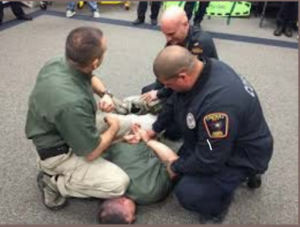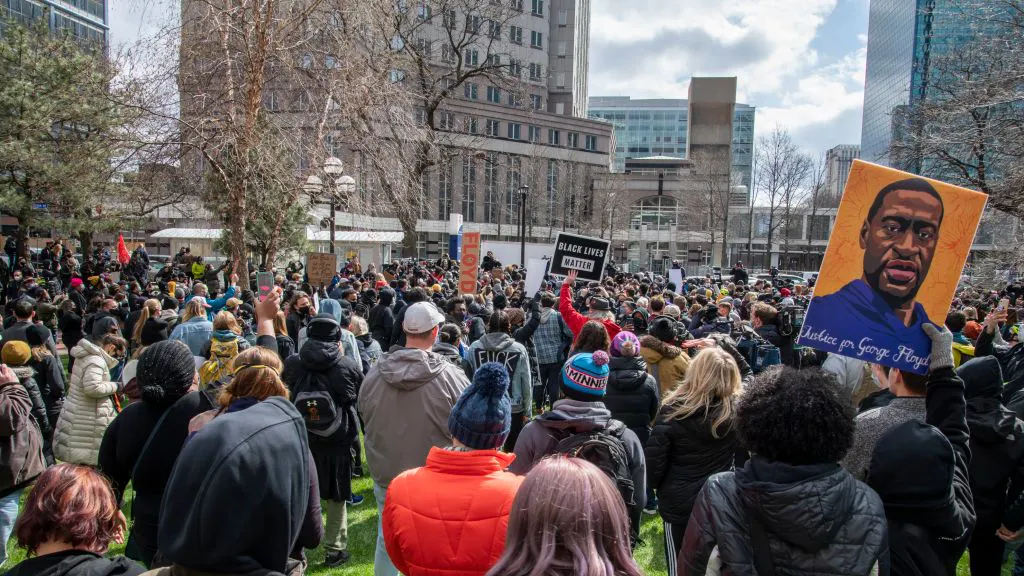Derek Chauvin was tried in a Minneapolis courthouse surrounded by barbed wire, concrete block, two armored personnel carriers, and a squad of national guard troops, with hundreds of additional troops stationed throughout Minneapolis, all of which were there for one reason — to quell a riot if the jury acquitted him.
Would you want to be tried before a jury bracing for a riot if it acquitted you? No one would and the Bill of Rights Sixth Amendment guarantee to a “fair trial” should prevent such a spectacle. However, that did not happen in Derek Chauvin’s case. Chauvin is now seeking to have the Supreme Court find his trial violated the Sixth Amendment and order that Chauvin be re-tried in a community which would not break out into riots if the jury acquitted Chauvin.
On May 25, 2020, George Floyd died while Chauvin and three other Minneapolis police officers attempted to arrest him. Presumably everyone reading this article knows who Derek Chauvin is and what happened on May 25, 2020. As one juror testified, “you have to live in cave not to know what happened.” However, there are details of what happened that were not widely reported in the media. For instance, the Minneapolis Police Department trained its officers to use the restraint technique Derek Chauvin and the other officers used in restraining Floyd. Below is a photograph of the technique from the Minneapolis police training manual:

Minneapolis Police Training Manual
When Derek Chauvin’s attorney tried to introduce this photograph into evidence, the state objected arguing there was no evidence Chauvin was trained on this technique and the court sustained the objection. However, whether Chauvin was trained on this technique was irrelevant – the issue was whether the technique is an acceptable use of police technique to restrain a suspect and it is.
Virtually the day after Floyd’s death, the slogan “Get off our necks” went viral creating the narrative that Chauvin placed his knee on Floyd’s neck with such force that Chauvin’s knee choked off Floyd’s trachea causing Floyd to die of suffocation. That narrative is false and the state admitted it at trial. The state’s medical expert – and Chauvin’s medical expert – agreed: Floyd died of a cardiac arrhythmia – his heart was beating so irregularly that he could not get sufficient blood pumping in his body. The state’s medical expert testified the cardiac arrhythmia was caused by “positional asphyxia” – the weight of Chauvin’s knee on Floyd’s back, not neck – restricted Floyd’s chest from expanding sufficiently for Floyd to breathe in enough oxygen. However, whether police officers placing their weight on a suspect’s back while handcuffed can cause someone to die from positional asphyxia has been refuted by numerous academic studies. A 2017 study — ironically co-authored by a University of Minnesota professor — concluded that scientific studies have “thoroughly debunked” this theory.
Individuals die of positional asphyxia when they have 1,000 pounds on their back — not Derek Chauvin’s 145 pounds.
So what else can cause a cardiac arrhythmia? High blood pressure, 75% – 90% blockage in coronary arteries, enlarged heart, recent use of fentanyl and methamphetamine, and stress — all of which the state’s medical experts admitted Floyd exhibited when he died.
In order to convict Derek Chauvin, the jury had to believe two expert opinions the state offered: (i) Chauvin used force unreasonable for a police officer in restraining Floyd and (ii) that this unreasonable force was a substantial cause in Floyd’s death. As set forth above, these expert opinions were heavily contested at trial. Despite this, the jury returned a guilty verdict after deliberating for only a day. This is why the Sixth Amendment’s guarantee of a trial before an impartial jury is so important.
The Supreme Court has held in numerous cases that excessive pre-trial publicity can violate a defendant’s right to a fair trial. The court’s concern is that the potential juror’s exposure to pre-trial publicity — and its effects in the community — will cause the jurors to conclude the defendant is guilty before the trial even begins. Usually, the trial court will be able to ferret out such bias by questioning the potential jurors prior to trial. However, the Supreme Court has held that in some cases the pre-trial publicity — and its effects in the community — will be so overwhelming that the court must presume that the jurors will be irrevocably prejudiced against the defendant. If the court finds such a presumption exists, the court must move the case to be tried in a location which has not suffered from the effects of the alleged crime or been exposed to such massive pre-trial publicity. This is what happened with Oklahoma City bomber Timothy McVeigh — his trial was moved from Oklahoma City to Denver, Colorado.
It is unquestionable that Floyd’s death, the riots in Minneapolis, and the state charging Chauvin arguably generated the most pre-trial publicity in American history. Everyone saw the viral video of Chauvin and the other officers using the restraint technique pictured above. Everyone knew of the riots in the Minneapolis metropolitan area which lasted for six days and caused over $500,000,000 in damage — the second-worst riots in American history.
Media in the Minneapolis metropolitan area covered Floyd’s death and Chauvin literally every day from May 25, 2020, through the April 19, 2021, guilty verdict. More importantly, the coverage continued the false “get off our neck” theme and demonized Derek Chauvin. Thus, all of the potential jurors examined for the Chauvin trial — 131 potential jurors — said that they had been exposed to this pre-trial publicity. Many potential jurors were removed because the pre-trial publicity caused such jurors to be prejudiced against Chauvin. Ultimately, despite exposure to this pre-trial publicity, the trial court seated 13 jurors to try Chauvin.
The pre-trial publicity made it impossible for Chauvin to get a fair trial in Minneapolis. The Sixth Amendment required the trial be moved out of Minneapolis. However, that is not the principal problem. The principal problem is that the jurors knew that their own — and their family’s – personal safety was at risk if they acquitted Chauvin. Unlike the pre-trial publicity which the jurors read about the incident, the Chauvin jurors experienced the riots because they lived in the rioted communities. The rioters’ message was clear — convict Chauvin or else.
As a result, the potential jurors and seated jurors expressed concerns for their personal security if they acquitted Chauvin. The state knew this threat was not theoretical. The state deployed soldiers – not police – soldiers to protect the courthouse during the entire trial and deployed soldiers throughout the city prior to the verdict. Moreover, the threats continued after the rioting ended. Prior to trial, “protestors” assaulted attorneys representing the other officers after a pre-trial hearing.
During the trial, another police incident sparked another set of riots in a Minneapolis suburb, Brooklyn Center, leading to another deployment of soldiers to quell the riots. One of Chauvin’s jurors certainly experienced this second set of riots when she returned home in the evening from the Chauvin trial because she lived in Brooklyn Center. California Rep. Maxine Waters (D-CA) spoke to the Brooklyn Center rioters telling them to get “more confrontational” if the jury acquitted Chauvin. One wonders how active rioters would interpret a lawmaker telling them to get more confrontational when they are already rioting.
Despite the fact that the court attempted to maintain the jurors’ anonymity during trial, one juror’s identity was exposed and he requested the court excuse him due to concerns for his safety. The court refused despite telling the juror “your concerns [with safety] are perfectly understandable. All of us on this case whose names are out in the public understand the concerns.”
The Sixth Amendment prohibits trying a criminal defendant before a jury who has such a personal stake in the outcome of trial – if you acquit, your community will be burned and your personal safety may be at risk. While the overwhelming pre-trial publicity justified moving Chauvin’s trial out of Minneapolis under the Sixth Amendment, the riots and threats of implicit and explicit violence to the jurors and the community they lived in demanded it.
William F. Mohrman is an attorney practicing in Minneapolis. Mr. Mohrman is representing Derek Chauvin on his appeal.
The views expressed in this piece are those of the author and do not necessarily represent those of The Daily Wire.

Continue reading this exclusive article and join the conversation, plus watch free videos on DW+
Already a member?

.png)
.png)

